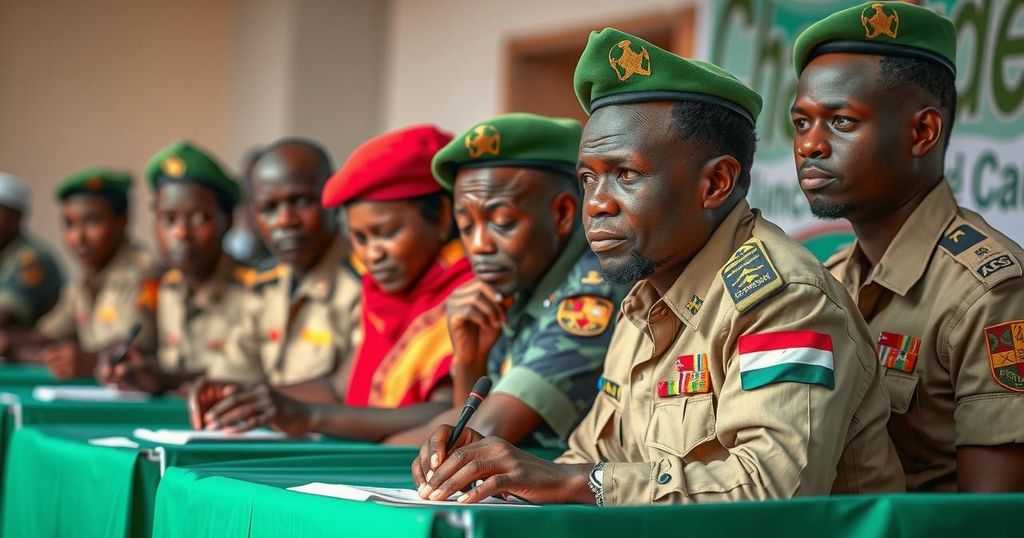Chad Conducts Controversial Elections Amid Opposition Boycotts and Allegations of Fraud
Chad holds legislative, provincial, and local elections after three years of military rule, yet the opposition is boycotting the votes, raising concerns about electoral integrity. With allegations of fraud and a restrictive media landscape, the legitimacy of these elections is in question. This electoral process, seen by the government as a transition to democracy, occurs amidst ongoing jihadist threats and political unrest.
On Sunday, Chad conducted legislative, provincial, and local elections following three years of military governance. The government has framed this electoral process as the final step in a political transition, although the opposition is boycotting the vote. This boycott potentially favors candidates supportive of Marshal Mahamat Idriss Itno, who assumed power following a military coup in 2021 and was subsequently elected in a controversial presidential election last May. Opposition leader Succes Masra openly criticized the electoral process, suggesting the results have been predetermined.
On the eve of the elections, opposition parties, including the Democratic Party of the Chadian People (PDPT), reported alleged irregularities, such as the disappearance of over a thousand ballots. Polling stations operated from 6 AM to 6 PM, expecting around eight million registered voters, with oversight from international observers and party representatives. Voting also commenced a day earlier for military personnel, police officers, and nomadic citizens.
Chad’s elections have been mired in controversy, taking place amidst ongoing threats from jihadist groups like Boko Haram and the termination of a military agreement with France. Marshal Itno rose to power after the death of his father, long-standing ruler Idriss Deby Itno, and won a term in a disputed election, which has led critics to warn that the government is trending towards authoritarianism.
The previous legislative elections occurred in 2011, with subsequent votes delayed due to various challenges, including security issues and public health crises. Despite government efforts to galvanize public interest in the elections, the situation is compounded by restrictions on the media, with private outlets unable to report on election day due to a lack of financial support from the government.
In summary, Chad’s elections are characterized by widespread opposition boycotts, accusations of electoral fraud, and a troubling political climate. With threats from jihadist groups and restrictions on the press, these factors contribute to a complex backdrop against which these elections occur. Consequently, the legitimacy of the voting outcome remains a subject of significant concern among many Chadians.
Opportunities for meaningful political change appear limited under the current regime, as reflected in the sentiments of the opposition, who argue that the government’s actions undermine democracy and foster repression. The future of Chad hinges on how these elections will steer the country towards a more inclusive and democratic governance structure.
“It is better to stay at home,” said opposition figure Succes Masra, criticizing the electoral process as a facade.
There are no external links referenced in the original article.
In conclusion, the legislative, provincial, and local elections in Chad are taking place against a backdrop of opposition boycotts and allegations of electoral manipulation. With critical accusations of bias in favor of the ruling party, and amidst tensions from jihadist threats and a suppressed media landscape, the legitimacy of this electoral process is gravely questioned. The path forward for Chad’s political landscape remains uncertain as these elections unfold under such contentious circumstances.
Chad has been governed under military rule since 2021, following the death of long-time president Idriss Deby Itno. The subsequent rise of his son, Marshal Mahamat Idriss Itno, has been marked by significant controversy, including allegations of electoral fraud during a recent presidential election. These current elections are positioned as crucial for transitioning toward civilian governance, yet widespread opposition and concerns over electoral integrity suggest a continuing struggle for democracy in Chad.
These elections in Chad symbolize a potential turning point but also reflect the persistent tensions and challenges faced by the nation. With efforts to stabilize the political landscape tainted by skepticism from the opposition and the danger of jihadist activity, the outcomes may lack the legitimacy and acceptance crucial for a true transition to democracy. Ultimately, Chad’s future will depend on addressing these underlying issues to foster genuine political reform.
Original Source: www.barrons.com




Post Comment